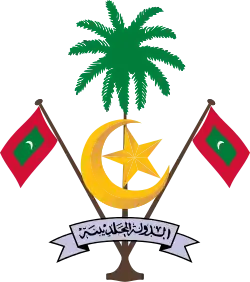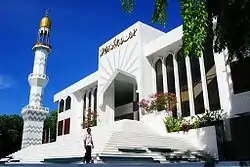Human rights in the Maldives
Human rights in the Maldives, an archipelagic nation of 417,000 people off the coast of the Indian Subcontinent,[1] is a contentious issue. In its 2011 Freedom in the World report, Freedom House declared the Maldives "Partly Free", claiming a reform process which had made headway in 2009 and 2010 had stalled.[2] The United States Bureau of Democracy, Human Rights and Labor claims in their 2012 report on human rights practices in the country that the most significant problems are corruption, lack of religious freedom, and abuse and unequal treatment of women.[3]
 |
|---|
| This article is part of a series on the politics and government of the Maldives |
History and political situation
The Maldives gained independence from the United Kingdom in 1965. The nation began its independent existence as a sultanate, but a 1968 referendum approved a constitution establishing the nation as a republic. Ibrahim Nasir, Prime Minister under the sultanate, became President and held office from 1968 to 1978. He was succeeded by Maumoon Abdul Gayoom, who was elected President in 1978 and re-elected in 1983, 1988, 1993, 1998, and 2003. At the end of his presidency in 2008, he was the longest serving leader in Asia. The national government generally exercised tight control over its people during this time.
The following chart shows the Maldives' ratings since 1972 in the Freedom in the World reports, published annually by Freedom House. A rating of 1 is "free"; 7, "not free".[4]1
| Historical ratings | |||||||||||||||||||||||||||||||||||||||||||||||||||||||||||||||||||||||||||||||||||||||||||||||||||||||||||||||||||||||||||||||||||||||||||||||||||||||||||||||||||||||||||||||||||||||||||||||||||||||||||||
|---|---|---|---|---|---|---|---|---|---|---|---|---|---|---|---|---|---|---|---|---|---|---|---|---|---|---|---|---|---|---|---|---|---|---|---|---|---|---|---|---|---|---|---|---|---|---|---|---|---|---|---|---|---|---|---|---|---|---|---|---|---|---|---|---|---|---|---|---|---|---|---|---|---|---|---|---|---|---|---|---|---|---|---|---|---|---|---|---|---|---|---|---|---|---|---|---|---|---|---|---|---|---|---|---|---|---|---|---|---|---|---|---|---|---|---|---|---|---|---|---|---|---|---|---|---|---|---|---|---|---|---|---|---|---|---|---|---|---|---|---|---|---|---|---|---|---|---|---|---|---|---|---|---|---|---|---|---|---|---|---|---|---|---|---|---|---|---|---|---|---|---|---|---|---|---|---|---|---|---|---|---|---|---|---|---|---|---|---|---|---|---|---|---|---|---|---|---|---|---|---|---|---|---|---|---|
|
After a coup attempt by supporters of Nasir was uncovered in 1980, the government arrested those thought to be involved, and their wives and children were placed under house arrest. At least three people were sentenced for association with the former president, and at least one – Mohamed Ismail Manniku Sikku, the former Director of Civil Aviation – was banished to an uninhabited atoll for "ten years and a day".[5]
The president considered responsible for the human rights gains in 2009–2010,[2] Mohamed Nasheed, resigned after weeks of protests led by police and was placed under house arrest.[6][7][8] He was replaced by Mohammed Waheed Hassan, the former head of UNICEF Afghanistan.[9]
Current issues (2008–)

Freedom of religion
The constitution states that all Maldivians must be Sunni Muslim.[10] On 14 December 2011 a group of ten men attacked peaceful demonstrators in Malé calling for religious tolerance. Sufi Ismail Khilath Rasheed sustained a skull fracture and was later arrested as his calls for tolerance were unconstitutional. No effort was made to arrest the attackers.[10] On 5 June 2012, Rasheed was stabbed in the neck.[11] Reporters Without Borders stated that it appeared that he had been deliberately targeted for his journalism.[12] A minister of the Maldivian government condemned the attack, but also added "Hilath must have known that he had become a target of a few extremists ... We are not a secular country. When you talk about religion there will always be a few people who do not agree."[13]
The Ministry of Islamic Affairs is the only body which grants licenses to imams, and sermons must be approved. They also control religious education and have the power to deport any non-Muslim. Non-Muslim foreigners must practice their religion in private.[2]
Freedom of speech
Defamation and Speech "contrary to the tenets of Islam" is illegal.
Media and censorship
2008 saw the Maldives' first private television channels. In August 2010 private channel Villa TV was attacked, and journalists were attacked by police for covering a political protest in October 2010.[2] Opposition websites can be accessed in the country, but some Christian missionary websites have been blocked by the Ministry of Islamic Affairs.[2]
On 1 May 2011 two journalists – one from Haveeru Daily and one from Sun FM – were arrested for covering a protest. They were released after 24 hours.[3]
Freedom of assembly
The constitution protects "freedom of peaceful assembly without prior permission of the State", and the U.S. State Department claims these rights are generally upheld.[3]
In July 2020, Human Rights Watch denounced the Maldivian government's recent enforcement of laws restricting protests and other gatherings, saying that the government's actions constituted a violation of fundamental rights. The government's decision to enforce the laws came in the wake of multiple protests staged during the month of July.[14]
Legal system

The Maldives does not practice Sharia Law. Most judges have no formal legal training and are given much leeway in their interpretations of Muslim law.[10]
The Maldives National Defence Force holds human rights courses.[3]
Allegations of arbitrary arrests and torture
Flogging is a frequently imposed punishment, and carried out behind the court buildings.[10] 96 people – over 80% of them women – were sentenced to this mode of punishment in 2010.[3]
Arbitrary arrest and detention is illegal.[3]
At least four members of parliament were arrested in July 2010. They claimed the detentions were carried out to force them to comply with political demands. They were released soon after.[15] On 16 August 2011 one of these MPs, Abdullah Yameen, was granted compensation.[3]
Minority and women's rights
Parliament contains five female members, and women have a 98% literacy rate.[2]
In 2011 four police officers were discharged from the force, but not formally charged, for driving a woman around Malé, forcing her to strip her clothes, sexually and physically abusing her, and throwing her on the street.[3]
As the state partially practices Sharia law in some matters, homosexuality is illegal. The punishment for men is nine months to one year imprisonment, or 10 to 30 lashes. The punishment for women is nine months to one year of house arrest.[3]
See also
Notes
- 1.^ Note that the "Year" signifies the "Year covered". Therefore the information for the year marked 2008 is from the report published in 2009, and so on.
- 2.^ As of 1 January.
- 3.^ The 1982 report covers 1981 and the first half of 1982, and the following 1984 report covers the second half of 1982 and the whole of 1983. In the interest of simplicity, these two aberrant "year and a half" reports have been split into three year-long reports through interpolation.
References
- "CIA Factbook".
- Freedom House (2011). "Freedom in the World 2011: Maldives". Freedom House. Retrieved 2012-08-25.
- Bureau of Democracy, Human Rights and Labor (2012). "Country Reports on Human Rights Practices for 2011: Maldives". United States Department of State. Retrieved 2012-08-24.
- Freedom House (2012). "Country ratings and status, FIW 1973–2012" (XLS). Retrieved 2012-08-22.
- Amnesty International (1981). "Maldives". Amnesty International Report 1981. London: Amnesty International Publications. pp. 242–23. Retrieved 2012-08-24.
- "Maldives President Mohamed Nasheed resigns amid unrest". BBC News. 7 February 2012. Retrieved 7 February 2012.
- "Maldives' VP Hassan Takes Oath as President". Male, Maldives: Time Magazine. Associated Press. 7 February 2012. Retrieved 7 February 2012.
- Mark Magnier (7 February 2012). "Maldives president resigns after weeks of protest". Los Angeles Times. Retrieved 7 February 2012.
- "Dr. Waheed's biography". drwaheed.com. Archived from the original on 27 April 2012. Retrieved 31 March 2012.]
- Amnesty International (2012). "Annual Report 2012: Maldives". Retrieved 2012-08-26.
- JJ Robinson (5 June 2012). "Prominent blogger Hilath Rasheed in critical condition after stabbing". Minivan News. Archived from the original on 8 June 2012. Retrieved 12 June 2012.
- Roy Greensdale (6 June 2012). "Maldives journalist stabbed in the neck". The Guardian. Retrieved 12 June 2012.
- "Liberal blogger stabbed in the Maldives: Police". The Express Tribune. Agence France-Presse. 5 June 2012. Retrieved 12 June 2012.
- "Human Rights Watch slams Maldives govt's restriction on protests". The Edition. Retrieved 15 July 2020.
- Amnesty International (2011). "Annual Report 2011: Maldives". Retrieved 2012-08-26.
External links
- Reports
- Country Report on Human Rights Practices for 2011 by the United States Department of State
- 2012 Human rights report by Amnesty International (also available in Arabic, French, and Spanish)
- Freedom in the World 2011 Report, by Freedom House
- International organizations
- Maldives at Amnesty International (also available in Arabic, French, and Spanish)
- Maldives at Human Rights Watch
- Maldives at FIDH
- Maldives at the Office of the United Nations High Commissioner for Human Rights (OHCHR)
- Maldives at UNICEF
- Maldives at the International Freedom of Expression Exchange (IFEX)
- National organizations